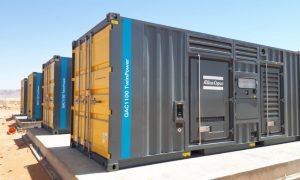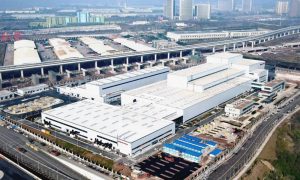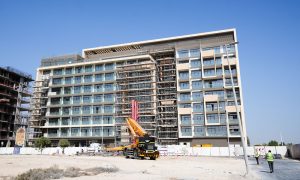Project Power
Solution providers Byrne Rental and FAMCO talk about the challenges they overcome to bring power to the Middle East’s biggest projects
How do your operations differ from each other?
Graham McDonald: FAMCO meets requirements from small-range to projectsize, supplying equipment with the capacity to provide anything from 2.2 up to 2800 kilovolt-amps (KVA), and we are supplying both the generators and accessories required; for example extra capacity fuel tanks, noise level containment systems and so on.
We have one of the best reputations for after sales service in the country and a set of commitments, which we follow very strictly and measure in terms of speed of delivery; installation of parts and availability of parts; and service support.
We also have an Al Futtaim training centre, where we train mechanics across all levels of the company; from technicians to supervisors. It is a very dynamic scheme and even managers go through training, which allows us to build capacity all the time.
Patrick Fallon: Byrne Equipment Rental is purely a rental company; we do not represent anybody and the problem we find now is that we are competing with our suppliers. Many of our suppliers have developed rental wings to their businesses and this to me is somewhat of a conflict of interests.
The difficulty I find is that as they dilute and get into the rental business, some of the basis upon which their business was founded has started to suffer; for example the level of service delivered. The reality is that these companies, post
crash, have had to look elsewhere for business, some by starting rental businesses. In addition, a lot of suppliers unfortunately don’t carry stocks as they did in the past, and don’t provide key services it’s a worrying trend in the market.
We are in the position where any client can approach us with confidence and feel Byrne are the people who can start off with the most fundamental requirements on a site or project and work right the way through with that client until the end. Not many companies can say that.
What trends are you witnessing in the market and how have these developed?
GM: Outside of the UAE, we are seeing an increase in the size of the generator sets required in Africa, where many countries have infrastructure issues to do with electricity and the grids. As the macro economies begin to increase and develop, there is more prosperity and they are looking for a higher range of gensets; we’re now exporting around 3000 units per year up to 75KVA.
In terms of potential, for example, statistics show Nigeria imports around 45,000 gensets a year and Angola is not far behind. There is an enormous amount of opportunity in Africa. Within the UAE this year, we are seeing particular requirements for anything from 100 to 700 KVA, now our enquiries are mainly coming into that size. With a lot of projects currently on hold, not all those enquiries are turning into orders at the speed they were before, but we are seeing that sort of trend.
PF: We didn’t expect some trends to develop as they did; you have to look at where we stand now. Graham has talked about exporting to Africa and that is indicative of how it goes as a supplier; you have to look at new markets and
innovate. From our perspective in rentals, nobody expected what was going to happen in 2008 and 2009 and we have been forced to go back to the building blocks.
In terms of competition, in 1995 we did a survey of all competitors strictly in rentals. From memory we identified 22 rental companies, construction companies renting surplus plant and transport, and other companies dipping into rentals. Three years ago, we repeated the exercise. We stopped counting at 77.
From the mid-2000s people jumped on the bandwagon, when generators in particular became very popular. Even today I am still coming across companies I have never heard of, dipping into rentals.
The trend emerging is that, in addition to suppliers becoming competitors, there are some seriously small companies having an impact on the industry as a whole.
These people operate from a smaller cost base and clients — who you cannot blame — think they are saving money.
Unfortunately you are being forced to compete and clients don’t look beyond lowest price. It doesn’t matter where you are trying to position yourself, the word ‘discount’ rolls off people’s tongues far too easily. We hold the position we are in because we have a business built on good service and good people, but there are plenty of threats out there.
GM: We are a solutions provider and it’s quite right our business is to sell solutions to buyers like Byrne.
PF: To do both sales and rentals you have to set up two different businesses with very different structures to do justice to what you want to do. As Graham will confirm, you have to provide all the associated services and do it properly — claiming to be able to deliver and physically delivering are two very different positions.
We on the other hand present ourselves in the rental market as equipment rental solution providers; as Graham said, if there are rental providers in the business for a quick buck, and therefore damaging it, that puts pressure on your margins right there.
Which are the strongest markets and what are the issues are occurring in these and others?
PF: We have four depots in Saudi Arabia, one large depot in Qatar, two depots in Oman and three businesses in the UAE. In the UAE, while Abu Dhabi is quite strong, there is still pressure on price, particularly on the power generation
side, and this looks set to continue. Qatar has seen a major influx in competitors, particularly in the last 12 to 18 months who, regardless of the World Cup, still believe it holds enormous opportunity in terms of wealth, vision and ability to fund infrastructure.
Saudi Arabia has been steady for years; it is a market that will continue to develop as they have major requirements, particularly in the oil and gas industry and infrastructure development; it’s definitely a place of the future. Credit terms and credit management is an enormous problem. Unfortunately if you lay down the rules and say this is the basis on which I am prepared to work, some people decide to take chances and blow you out of the water with risky terms- often at a huge loss to themselves.
GM: The demand for primary and stand-by electricty will continue to increase across the GCC, so in principle the market will allow us to have a strong genset business. Price pressure continues to be a factor and a number of projects are suspended or awaiting another phase. We also represent Yanmar Marine and have done for 30 years. It’s one of the oldest franchises in Al Futtaim (FAMCO).
We supply up to 1800 horse power, so we’re in the medium classification for diesel propulsion. We don’t just supply the engines but also the propulsion systems; it could be a water jet, a stern drive or a straight forward stern gear and propeller.
We’re into oil and gas in terms of supply cargo vessels; the leisure sector; and we have supplied many privately owned boats with their power requirements. We have a naval architect on our team and can work with the boat’s designers from the early stages. The propulsion package is as they want and then we do the installation and so on.
There may be a flat construction market, but we have a growing marine business.
Where do the primary opportunities lie for each of your companies?
GM: For us it is across a number of sectors; industrial, commercial and providing standby power or supplementing demand on the grid through the utilities companies, based on the infrastructure they have now.
Construction will return to a stable growth rate and provide opportunity for us again in the future, but currently the main niche for us now is projects with the higher KVA requirement. In terms of doing what we are good at, we are good at projects and putting a solution together for clients, and there are a number of sectors we are targeting.
PF: I tend to agree. There is opportunity here for both our companies, taking into account the economic problems faced by the western world. Quite rightly, in terms of the project business; no supplier can make it selling generators
of 100KVA at a time, one by one. Building business is about big project work.
Dubai has problems to a point, but they are not quite as serious as what we see elsewhere around the world.
In time people will slowly look to develop and invest here more and that presents us with opportunity. Outside of the region it is hard to know because as a business we are very much within the GCC so the footprint hasn’t gone outside
the GCC as yet.
We will look to develop our existing markets and here in the UAE we will position ourselves for the market recovery. Qatar can produce an opportunity, particularly because of who they are with their gas reserves. My sense is that Oman will also develop as they have big plans, but need to overcome recent political problems and Saudi Arabia is an area of tremendous opportunity for the future.
Do eastern markets pose any threats to your operations?
GM: Chinese and Indian competitors are crowding into the market place, making things difficult in a certain band of kilowatt range. But saying that, if you have good quality product, like Yanmar, you can compete successfully.
In addition to the export potential in Africa, the UAE re-exports US $400million of products; that market is huge and has been controlled from Deira for hundreds of years. You can see the products waiting for re-export, demonstrating
the enormous amount of traffic passing through; it truly is the hub for the region.
PF: From the rental perspective on competition there are opportunities, particularly from the Caspian region and former CIS states, and further around the Gulf as areas like Iraq settle down. Not so much from the east, but competitionwise in rentals we have seen a number of new companies join the market here from Europe.
So far they haven’t had the expected impact, but in future you will see more companies in Qatar, in particular coming from Europe, looking for the 2022 magic.
For the sellers, some are of the carpet bag variety; coming in and trying to sell something then flying off again. In this market you have to be able to back up the sale, service it, live up to the conditions of the warranty, and if that isn’t
provided clients are effectively burning money.
How has the market for renewable power affected operations and product development?
PF: In the rest of the world, the race is on to look for new ways to generate power. Because of the availability and affordability of fossil fuels here I think the Middle East will probably be the last to get on the boat. People think this
region should be alive with solar power and it’s just not. It has never been properly developed or understood.
There is expense involved in dealing with alternative sources and right now there is a cheap method of doing so through the likes of power generation. I think the pressure to become green over time is there. Most companies
are trying to address that and the emissions targets are getting tougher.
GM: The Euro Tier 3 engines have been in effect for some time so the need to produce a cleaner environment around desiel is going to be very strong. But saying that diesel fuel does give you the benefits and gensets can be transported across the world at a moment’s notice; it is reliable, instant and cheap, so it will continue to be a solution. I think the long term market for clean diesel engines will remain.
PF: It’s like anything else, the need for alternative energy sources comes from cost. You have oil prices as they stand now and countries heavily dependent on oil screaming for alternative energy sources.
When the issue of cost becomes that important here; you are going to have tremendous pressure meanwhile you have the other issue of shortage of power. Even today most of the markets in which we operate do not have sufficient
power resources. As long as that remains so will the market for power generation.
GM: I agree.
How do you predict the market will develop?
PF: Predictions are a dangerous thing. What we have started to see from a fundamental perspective, is that the market in its current state is challenging us all to be sharper in terms of competition, delivery, competence and capability
to back up what we do and, on the whole, sharper in the rental solutions business.
That demand from customers, which will often be at prices that we will often find unpalatable, will continue. Equally, based on what we witness in the market some of the companies which have created the poorer practices will fall away, and in fact some have already begun to do so.
Professional companies are keeping standards high and staying in business, and I think that can only be good for the future. Perhaps our traditional markets are not as strong and buoyant as they were in the past, but you have to innovate and diversify to succeed in the future.
Hunger is good salt and the hunger to stay in business is something that will bring innovation to our business in the years ahead.
GM: It was a seller’s market and clients now are becoming very demanding about what they want and pricing levels are very competitive, and so the sales force has to turn from order taking to consultative selling.
We work very hard with our sales staff to build their capacity and it’s a case of managing the decline. Some of us who worked in the European business survived through a number of these cycles and here the market is facing a similar
case, but it is a demanding market. Clients are being very demanding about the products they get and the quality. After sales is a major part of business operations, and if you build that capability you will position yourself well to build demand for new products.
PF: People have an expectation to be sold, rather than to go out and buy. The capability for that has to be sharpened to new levels. The order taker is gone — that’s what we, like many other industries, were in 2006 and 2007.
Even the approach from our suppliers was “this is the price, take it or leave it”. If you missed that price, somebody else would come and take it. Even at Byrne we are spending more and more time developing these key selling and servicing skills.





























